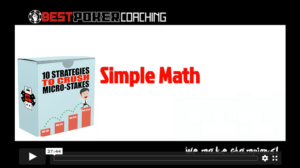This is a fundamental concept that I see countless players getting wrong on a regular basis. There are only two strong reasons to bet and one reason that is, in my opinion, the main reason behind most players -EV bets. The reasons to bet are to 1, to get worse hands to call (value bet) and 2, to get better hands to fold (bluff).
BETTING FOR VALUE
The most important reason to bet in micro stakes poker is to get value. Any time we think we can make a bet and frequently be called by a worse hand, we should be making that bet. It is a really simple concept but I see countless players failing to do it and messing their ranges up by turning hands that can get clear value into bluff catchers. This mostly happens when the player is out of position and either:Doesn’t want their opponent to fold, or
- Doesn’t want their opponent to fold, or
- Doesn’t want to get raised by their opponent.
The problem with that mindset is that it’s only considering both of the worst case scenario’s and not considering the most likely scenario, which is that our opponent is going to call us with a hand weaker than ours. It can be scary sometimes to start betting at a hand when we’re out of position with a medium strength holding, so a lot of players just try to get to showdown as cheaply as possible.
The problem with this approach is that most often, we’re missing value when we do get to check down and end up paying off better hands when we check/call down. Both of these outcomes are clearly bad for our bottom line.
When our opponents fold, it’s most likely that they’re folding air or hands with very little showdown value. When they raise, unless we have reason to believe our opponent in the hand is a maniac, the raise is for value, which means we can comfortably fold our medium strength hands.
BETTING AS A BLUFF
The second most important reason to bet is to make an opponent fold a hand we believe to be better than ours. An example of this might be when we raise a hand like KQ and we miss on a flop of J92, we would consider betting here to gain folds from Ax, small pairs etc.When I make this kind of bet, I like to have some kind of equity to fall back on when I’m called. In the example given, we have two over cards and a gut shot straight draw, so if we’re called by a hand like AJ, A9, or pocket pairs worse than 88 we still have a decent chance of making the best hand. This draw gives us the opportunity to double barrel some turns, which is a concept that we’ll be discussing as a stand alone concept in future.
When I make this kind of bet, I like to have some kind of equity to fall back on when I’m called. In the example given, we have two over cards and a gut shot straight draw, so if we’re called by a hand like AJ, A9, or pocket pairs worse than 88 we still have a decent chance of making the best hand. This draw gives us the opportunity to double barrel some turns, which is a concept that we’ll be discussing as a stand alone concept in future.It can be hard to pull the trigger on these kinds of bets for some players. The common theory is that players don’t fold very much in the micro’s and that is true to an extent, players aren’t making many big folds with marginal holdings, which is why we like to have some outs to improve our equity when called by such holdings.
It can be hard to pull the trigger on these kinds of bets for some players. The common theory is that players don’t fold very much in the micro’s and that is true to an extent, players aren’t making many big folds with marginal holdings, which is why we like to have some outs to improve our equity when called by such holdings.
When you consider the above statement, it highlights why value betting as thin as we dare is such a good habit to get into. If we don’t believe people will fold weak made hands when we bet, it means we can easily get clear value, so get value betting more!
BONUS: FOLDING THEIR SHARE OF EQUITY
A final reason for betting, which I think is commonly misapplied is to get a villain to fold their equity share. For example, we have a hand like 88 on 724 and our opponent has just naked over cards. It’s hard to get value, as he’s unlikely to call with a hand like JT and he’s never folding a better hand like 99 or TT.
So theoretically, we are less compelled to bet but when he does have a hand like JT we’d like him to fold it if he’s never going to use it to bluff with when we check. He has 25% equity and it’s nice to fold that equity out in a spot where we can’t really get multiple streets of value and where almost half the deck is going to make playing a turn difficult for us.
CONCLUSION
I can’t end this lesson without referring to the bet for information line that way too many players take (also known as a probe bet). We should never bet purely for information. An example of this would be when we decide to bet a hand like 88 on an AK3 board. I regularly see players saying that they bet in spots like these for information. These bets serve absolutely no purpose whatsoever and if you find yourself doing this, you should stop it right now. Remember, we bet for value from worse, or to make better hands fold. Keep that in mind from your next session and see how it helps clear a lot of clutter from your mind as you play post flop.



